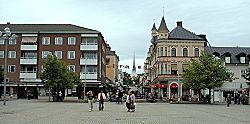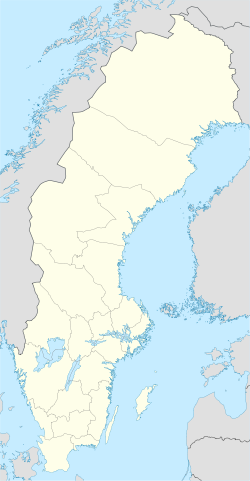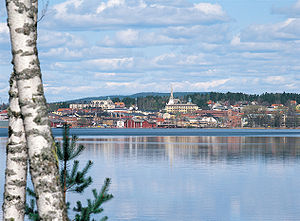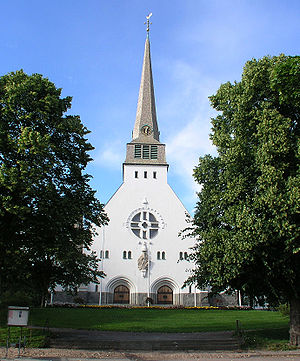- Arvika
-
Arvika Arvika centre in June 2004 Coordinates: 59°39′N 12°35′E / 59.65°N 12.583°ECoordinates: 59°39′N 12°35′E / 59.65°N 12.583°E Country Sweden Province Värmland County Värmland County Municipality Arvika Municipality Area[1] - Total 10.66 km2 (4.1 sq mi) Population (2005-12-31)[1] - Total 14,184 - Density 1,330/km2 (3,444.7/sq mi) Time zone CET (UTC+1) - Summer (DST) CEST (UTC+2) Arvika is a locality and the seat of Arvika Municipality, Värmland County, Sweden with 14,184 inhabitants in 2005.[1]
Contents
Geography
The town of Arvika is situated at Kyrkviken, a bay of Glafsfjorden, Sweden's only inland fjord, a remnant of the time following the last ice age (once a fjord of the Ancylus Lake).
The area is hilly with the tallest hill Storkasberget close to the town centre.
Arvika and its surroundings has excellent water infrastructure. In fact, Arvika has the innermost harbour in the whole of Sweden. Through a system of canals lake Vänern can be reached, and from there the Göta Canal allowes further passage to Gothenburg and Sweden's west coast.
History
Ten kilometers west of the city, in Bergs Klätt, there are remnants of a younger Stone Age and Nordic Bronze Age settlements in the form of graves.
The town was a village until 1811 when it was given town privileges by royal charter under the name Oscarsstad in order to improve the economy of the area. This attempt was unsuccessful, and the town privileges were repealed in 1821 and the town was instead given the status of köping (township) and renamed Arvika. The town privileges were reinstated at the founding centennial in 1911, and the name Arvika remained. The city status is now obsolete, but Arvika is since 1971 the seat of the larger Arvika municipality.
The churches Mikaelskyrkan, is from 1647 and the church in the centre, Trefaldighetskyrkan, is from the same year as the town, 1911.
Industry
Arvika has several heavy industrial production facilities which employ the majority of the population, among these Thermia, Volvo Construction Equipment (Wheel loaders), Arvika Gjuteri (nodular and grey iron foundry) and Coffee Queen, a coffemachine factory.
Culture
Arvika is known for the turn of the century (around 1900) artist commune Rackstad just outside the city. Here, several famous Swedish artists lived and worked, the most well-known probably being Christian Eriksson and Gustaf Fjæstad and his wife Maja Fjæstad. Other talents that lived in Rackstad include Björn Ahlgrensson and Fritz Lindström.
In recent times, the Arvika Festival (since 1992) is the biggest annual event in the area, with several international bands visiting the town during three days in July every summer. In recent years such bands as Einstürzende Neubauten, Hot Chip, Robyn, The Knife, Ministry, New Order, Kraftwerk and Franz Ferdinand have performed here. The 2009 festival was headlined by Depeche Mode, Nine Inch Nails, Röyksopp and Korn and was the biggest edition of the festival ever.
One of the six university colleges of music in Sweden, Ingesund College of Music, a department of Karlstad University, is situated in Arvika.
International relations
See also: List of twin towns and sister cities in SwedenTwin towns — Sister cities
Arvika has three twin cities:

Kongsvinger, Norway 
Skive, Denmark 
Ylöjärvi, Finland References
- ^ a b c "Tätorternas landareal, folkmängd och invånare per km2 2000 och 2005" (in Swedish) (xls). Statistics Sweden. http://www.scb.se/statistik/MI/MI0810/2005A01B/T%c3%a4torternami0810tab1.xls. Retrieved 2009-05-10.

Arvika is one of 133 places with the historical city status in Sweden. Localities in Arvika Municipality, Värmland County, Sweden Localities: Municipalities 
Municipal seats Categories:- Cities in Sweden
- Populated places in Värmland County
- Municipal seats of Värmland County
- Swedish municipal seats
Wikimedia Foundation. 2010.




